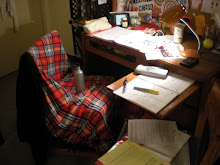A great way of finding out what people think about anything is by leading a focus groups, or group interviews. As a public relations major, I know that good common ideas and useful information will come about from my spending one afternoon with a few focus group members.
Last month, I sat down to brainstorm ideas about tap water and bottled water with a group of about 7 volunteers, only one of whom I'd previously known. As organizations like Tappening represent anti-bottled water causes, I wondered how effective these organizations might be in promoting the cause. Maybe the Nestle Waters giant is unstoppable.
Conducting the Focus Group

In the focus group I did - my first ever - I had about 7 Boston University students volunteer to participate for one hour. Luckily, these volunteers had moved to Boston from different regions of the U.S., allowing me a better random sample of the public that I might try to understand.
My hour-long focus group included questions about the respondents’ general views about buying bottled water and using tap water, their opinions about brand loyalty and bottled water brand advertising and their priorities about health and environmental issues. Respondents were even describing the particular bottled water brands they find most appealing - amazingly, Poland Spring and smartwater emerged as frontrunners. I couldn't exactly pinpoint why the focus members preferred these brands, but they did... I guessed Poland Spring from good branding and habit, and smartwater from its trendiness factor. But I pushed some more. It didn't seem like these volunteers were completely loyal to drinking bottled water, or to any bottled water brand at all.
I collected a good amount of info about consumer preferences and habits, and I received much input from the respondents about how tap or bottled water can be made more or less appealing. Learning from one another and inspiring each others’ ideas, the focus group
 members developed pretty honest opinions about the bottled water industry, tap water and overall water safety. They said tap water was dirty, but rather preferred the tacky words like "crisp" and "refreshing" that every Dasani or Deer Park ad tries to engrain in our opinions- apparently, not in vain. Yes, price was important to these volunteers, but trendiness was more important. Group opinion, overall, was really important. The respondents seemed to want to show consumer responsibility to one another and rationality for shotty marketing techniques... but they were caught. They criticized Jennifer Aniston's
members developed pretty honest opinions about the bottled water industry, tap water and overall water safety. They said tap water was dirty, but rather preferred the tacky words like "crisp" and "refreshing" that every Dasani or Deer Park ad tries to engrain in our opinions- apparently, not in vain. Yes, price was important to these volunteers, but trendiness was more important. Group opinion, overall, was really important. The respondents seemed to want to show consumer responsibility to one another and rationality for shotty marketing techniques... but they were caught. They criticized Jennifer Aniston'ssmartwater ads, but you better believe they all recalled the ads without my having them there that day. You better believe most of the volunteers had bought smartwater at some point.
Notable Findings
During my one hour, I heard a great amount of evidence that some consumers do also choose bottled water products based on habit or from familiarity. If one individual’s parents often bought Poland Spring bottled water, that individual tended to report buying Poland Spring when away from her parents. Participants also tended to buy bottled water if their peers and families have had the habits of buying bottled water in past years. Likewise, if the volunteers had grown up drinking tap water, they later continued to drink tap water and Brita-filtered tap water.

Those in the focus group recalled multiple bottled water advertisements in the media; this was evidence, too, that consumers have a high exposure to bottled water companies’ marketing ploys. Some participants, though, recalled campaigns supporting environmentalist and health campaigns concerning bottled and tap water. This was evidence that the public may be primed with some information about the controversies pertaining to water products, like environmental issues. The one friend I had in the focus group, however, was the only one who knew about BPA as a health risk. I wonder how. Drinking bottled water poses health risks too, people!
Suggestions for the Future
If anyone out there would like to piggyback off my initial focus group endeavor, it could be helpful to conduct more focus groups about some of the more pointed issues we talked about in this first focus group. While recycling habits was only one topic we discussed here, you might conduct a future session strictly about respondents’ knowledge about recycling and environmental effects; this might help ad or pr buffs learn more about how pro-environment claims persuade consumers. Tappening could especially use this advice, my god. Please refer to their horribly elementary and overall ineffective ad campaign. Good for a laugh, not good for cause mobilization.
Similarly, you might conduct a future focus group only about the health concerns entailed with drinking tap or bottled water. The respondents might find differences in the information they have heard reported in the media, and researchers can learn which persuasion tactics have might already affected publics to prefer or avoid tap or bottled water.
We need to know what people know. At times during this focus group, I was shocked to be reminded how normal consumers still think. Jennifer Aniston sells. And to rebuttal, measly NGOs and organizations create ads with cartoons of crying polar bears. Ineffective. I'm ashamed.
